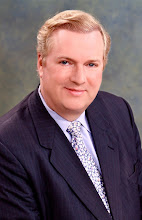In a week where there has been a big upheaval over Sen. Barack Obama's pastor, and to a lesser degree controversy over pastors who support Sen. John McCain, it's probably time to talk about the role of religion in American politics.
Perhaps lost in all the debate is the coincidence that this is Holy Week, leading up to Easter, certainly equal in importance to Christmas week on the Christian calendar.
There are those who feel religion should play a central role in public life, i.e. allowing prayer in school. And then there are those who feel there should be no reference to God in the public square, i.e. remove "In God We Trust" from our coins.
In the modern debate, it has always been whether to include or exclude religion from public policy. The country was indeed founded on the merits of the two contradictions. Many people came here seeking religious freedom, and freedom from oppression of monarchies in Europe. At the same time, people came here making it clear they wanted no state religion. To some that means no religion at all, in the town square.
I thought about the irony of that this week, as I watched Barack Obama make his eloquent address about racial issues in American, but also about his controversial Pastor, the Rev. Jeremiah Wright.
The fact that Obama is a hair's breath away from winning the White House is historic, in that he would be the first African-American (in truth the first bi-racial President, as his mother was white). The point is, that Obama would not be where he is today, if not for his religion. Follow me along in this argument!

Remember that big debate between Obama and Sen. Hillary Clinton this year, over who was more crucial to the Civil Rights movement, Rev. Martin Luther King Jr., or President Lyndon Johnson. The true answer is BOTH! If we truly have a separation of church versus state in this country, and both remain influential, then many times you can only succeed by working both sides of the aisle. King was the church, Johnson the state. One could not succeed without the other.
The key to the Civil Rights movement's success was the church. If not for the fervor (and the organizational skills of the black Baptist, AME and Catholic Churches, the movement would have collapsed.) King drove the movement from the pulpit, to the street and ultimately into the hearts of opponents. Why did he succeed?

Black America listened to a man who drew his reason from passages in the Bible, as well as the Constitution. Much of white America, which read the same Bible and Constitution, could not refute the passion or the arguments. But it's one thing to convince people to be on your side from a moral standpoint and quite another to get them to agree from a legal stand point. Enter President Lyndon Johnson.
For all his failings and mistakes, the Civil Rights movement may have been Johnson's stroke of genius. And as a Southerner (or near Southerner, as many don't consider Texas "the South"), he was able to persuade many white Southern politicians in Congress, it was time to support the Civil Rights Act and the Voting Rights Act. Johnson was an astute politician who saw the tidal wave on race relations as unstoppable. The recorded phone calls between him and Sen. John Sparkman (D-AL) that were made public a few years ago, are just as stark and raw and as gut level as politics gets. It was as if LBJ hired Bob Dylan to sing "The Times They are a Changin'" to those who needed final persuasion.
So MLK won the moral argument from the pulpit to the street, but it was LBJ who had to change the law, from the courtroom gavel to the floor of Congress.
People can argue for the "separation of church and state" all they want, but sometimes they are liked conjoined twins: two separate bodies, but joined at the vital organs. Over the years I have had the chance to interview Sen. John McCain and his fellow POWs in Vietnam, about how they survived. The answer was two-fold: an undying faith that their government would come rescue them, and the daily prayers they said together because their faith in God was all they had to hold them together in hope. It's a powerful combination in the face of despair!

As we celebrate the historic and miraculous Resurrection of Jesus Christ this week, it is important to remember, that church and state remain indelibly intertwined, no matter what certain court decisions say; its hard for one to grow and thrive, without the other. This country would never be what it is, without the good forces of both.
I will be reporting from Florida during Easter season, as the political future of that state's delegates remains in the balance. Check back often at www.MarkCurtisMedia.blogspot.com.
--------------------------------------------------------------------------------
Create a Home Theater Like the Pros. Watch AOL.

No comments:
Post a Comment